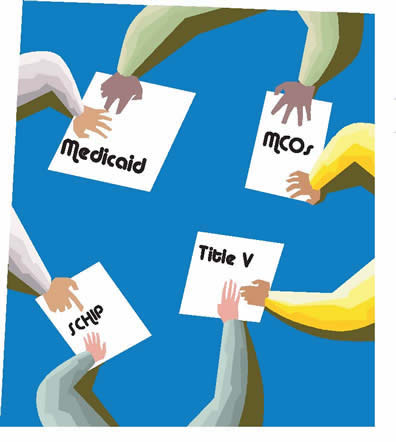 Printer-Friendly
Report (640KB)
Printer-Friendly
Report (640KB)

Acknowledgements
This document was produced by the U.S.
Department of Health and Human
Services, Health Resources and Services
Administration, Maternal and Child
Health Bureau under contract to the George
Washington University Center for
Health Services Research and Policy and
Johnson Group Consulting Inc.
I.
Introduction
Since 2000, the Center for Health Services
Research and Policy at The George Washington
University (GWU), has undertaken a series
of projects based on the Medicaid managed
care
contracts studies and the managed care
purchasing specifications. Specifically,
GWU
researchers developed Medicaid Pediatric
Purchasing Specifications and Children
with Special
Health Care Needs Purchasing Specifications
with funding from the Health Resources
and
Services Administration (HRSA) and the
Commonwealth Fund, among others. These
purchasing
specifications offer suggested model contract
language options for States to use in
drafting
managed care agreements.
In 2001, GWU worked with HRSA’s
Maternal and Child Health Bureau (MCHB)
to host a
workshop in Little Rock, Arkansas, for
teams of State and local officials from
six States. The
team members represented Medicaid, State
Children’s Health Insurance Programs
(SCHIP), Title
V, and local public health agencies. This
successful team approach became the model
for a
series of State-specific “leadership”
workshops, designed to address similar
issues as the Little
Rock workshops with the advantage of being
able to provide tailored technical assistance.
In 2004, five States responded to the
offer for technical assistance related
to child health and
used the workshops as an opportunity to
focus on particular challenges. HRSA’S
MCHB and the
Managed Care and Health Services Financing
Technical Assistance Center (MCTAC), John
Snow, Inc. co-sponsored this workshop
series. For each workshop, Jeff Levi of
GWU and Kay
Johnson of Johnson Group Consulting provided
faculty support. James Resnick of HRSA’S
MCHB attended each workshop. A leadership
group – including a minimum of leaders
from
Medicaid, SCHIP, Title V and local public
health – was assembled in each State
to plan,
convene, and attend the workshop.
Each workshop involved collaboration among
Federal sponsors, private-sector faculty,
and State
leaders. The role of HRSA’S MCHB
and MCTAC in co-sponsoring the workshops
was to:
identify the faculty to conduct the workshop,
pay for the honorarium and travel expenses
of the
faculty, and coordinate with Maternal
and Child Health leaders and faculty to
customize the
workshop to a State’s particular
Medicaid/SCHIP concerns. State-level co-sponsors
were
responsible for arranging and paying for
the following activities: 1) promoting
the workshop,
including the development, printing, and
mailing of the promotional materials,
2) sending
invitations to the target audience, 3)
securing meeting space, audiovisual equipment,
and the
food, if desired, 4) registering attendees,
and 5) identifying issues and developing
the agenda for
a workshop.
This paper describes the substantive results
of these “Advanced Leadership Workshops.”
We set
out to offer strategies, tools, and techniques
to negotiate fiscally sound managed care
contracts
that ensure the delivery of quality maternal
and child health services and to provide
practical
knowledge and experiential learning about
pediatric managed care contracts. The
workshop
content included this and more. Several
key themes and some promising new ideas
emerged.
Most important, perhaps, is how the workshops
created an opportunity for dialogue about
maternal and child health issues and challenges.
The paper concludes with some “lessons
learned” about the process of engaging
States in this technical assistance activity.
Finally, we note that much of what emerged
from these workshops is reflected in the
briefing
materials prepared with each State during
the planning process for their workshop.
(See
appendices.) These briefing materials
were developed to reflect each State’s
issues of concern
and each workshop’s agenda. Readers
are encouraged to read and refer to these
materials. |